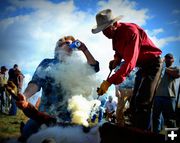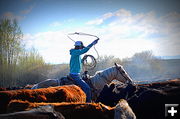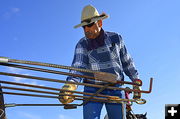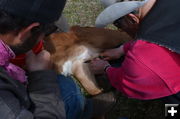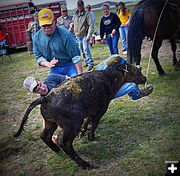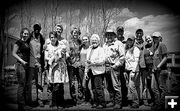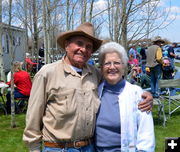
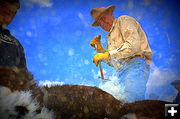
Norm Pape
Calf kicking up the corral. Photos by Terry Allen.
|

Scroll down for more photos
|
|
Pape Ranch Branding 2016
by Terry Allen
May 29, 2016
It is 6:30 in the morning and the old pickup truck is throwing dust into the air as it bumps along the dirt road through the undulating meadow. Past a long haystack and then slanting left the pickup heads for large rising clouds of dust and smoke where cottonwoods and willows grow abruptly up out of the earth. The driver finds a spot for his truck alongside a couple dozen other trucks and horse trailers and then he walks toward a big corral that is pushed up against the trees. It is full of mother cows, their calves, ropers on horseback and ground crews.
Just inside the corral, a propane fired furnace makes a steady whooshing sound and turns the branding irons red. Four Ground Crew teams stand ready to receive a calf from the Roper. The Roper selects a calf, throws a rope around his neck and drags it to the Ground Crew. Two Wrestlers each grab an end and throw the calf to the ground and then sit on it and release the rope. Two Branders each grab a hot branding iron and place a brand on the hide of the calf. Then, a Vaccinator standing at the ready steps forward and plunges the large hypodermic needle full of the legally required fluid into the shoulder area of the calf. The Greaser steps forward with what looks like a huge colored crayon and places a big colored streak along the calfís spine so it can be easily identified as branded. Now, if it is a bull calf, then Doc Johnston (age 84) comes over and turns it into a steer. Once removed, Doc throws those tenderÖand some say tasty bits into the old Folgers coffee can that Docís assistant carries. The Horn Remover then steps in and removes the budding horns since there is a problem with horned animals putting each otherís eyes out when they play or fight. Finally, the Wrestlers turn the calf around toward the herd and encourages it to find its Mother.
At least that is how it worked most of the time. Calves seem to be a lot like people. Some just seem to endure the process without much fuss. But others fight like hell, and it takes the whole team to get them on the ground and keep them there, but not before the calf skins up and mucks up everyone within its reach. An exception and worthy of note is the performance of Angela Ritsthel and Logan Lee. They have an efficient three-step process that seems to work every time. 1. Grab an end. 2. Leg-sweep the calf to the ground. 3. Sit on them. It is like a choreographed dance. No wasted effort. They could coach this stuff. I donít think they took a break all day.
I sidle up to team members and try to get a few words before they have to run to the calf to do their bit.
"There are five hundred to brand in the big corral," said David Pape. "Then the action moves to a second corral where we will brand two hundred more."
Todd Bennett went to school with Fred Pape and except for a couple years in college, hasnít missed a branding in 36 years. "Iím doing the horn removal today," said Todd. "I just use this tool to go through the hide to get the boney part. Itís sort of like taking a toenail off so it wonít grow back. If we leave the horns to grow, they will get to poking each other in the eyes, especially around feeding time. Most cattle these days are polled, meaning the horns are bred out of them. But we have about a third of the bulls that still grow them."
Ken Marincic turned over his horse "Killer" to another Roper and pointed at the amazing horse pattern on the backside of Killer. "I noticed it after I bought him," he said. "Heís about 15 or 15 years old now."
Colter Siems age 4, wraps his arms around the Nut Bucket and follows Doc Johnston. Doc does the castration surgery on a young bull. Colter holds the bucket out and Doc throws in the testicles. A while later I look for Colter so I can get a good photo. Doc says he thinks he saw him taking a break in the arms of his Mother. A little later, I think I see Colter helping a big guy in a Jack Daniels shirt stretching a calf and take a shot.
Norm Pape (age 85) is taking a few minutes break by just regulating the branding oven which gives him time to enjoy the show. "Itís a good day to spend with good people," said Norm. "Weíve done this as a Memorial Day and family reunion combined for all these years. When they are all branded, weíll take them off the meadows and onto pasture so we can raise a hay crop. Youíre invited to come to lunch down at Fred and Michelleís home for lunch. The cooks feed us real good."
Ron Kamp is a Gary Cooper looking and acting cowboy. He quietly runs the hot irons out and brands the calves as soon as they are firmly under control of the wrestlers. "The iron works best if they are slightly red," he said. "Iíve been branding on this ranch for about 25 years. Iím taking these cows to my place when we are done. I sell summer pasture to the Papes." Ron offers me a beer and I have to think for a minute because after all the hard work Iíve witnessed, I realize all Iíve done is just take pictures. Iím not sure I deserve one. But I accept and I learn from Ron that he had been of some help to the famous photographer Richard Avedon when he had come through this area to make the picture book "In the American West" of cowboys and other western characters. "My photo didnít make it into the book," he said. "But I helped him set up his photos and locations around here."
I next find myself standing by Rob Rooks, a cowboy that looks like he stepped out of the real old west. "Iím not related," he said. "But they (Papes) kind of took me in."
Lily Kraft is sitting on a pony and I ask if I can take her picture because she looks like a take-charge girl. I think shooting into the sun with a flash will give me the image I want. "You know, my pony doesnít like flash a lot," she said.
Doc Foster had told me a few days before the branding that the Papes were known as the Model Ranchers of the county, so I wanted to know what they did to earn that reputation. Norm told me the calves they are branding were all pretty much born in April and May. "Weíll turn the bulls in with the cows around the first of July," he said. "Cows are like humans, so weíll calve nine months later in April and May. There are about 20 to 25 cows per bull. I keep a diary of how much water we get in the year, when we turned the cows out, when we branded, what the weather was. We need to be organized. My Dad kept a diary and so I keep a diary. My boys keep diaries. We check the past years all the time. That really helps."
As the last calf is branded, Eric Marincic accepts a bag of nuggets from Doc Johnston. "Iím gonna take these and put them in a cool place," he says.
Fred makes an announcement and an invitation to everyone to have lunch at his place. It isnít too much later than normal lunch times. "Iíve been to some brandings where there wasnít enough help," said Fred Pape. "Itís a pretty rough day if you donít get to eat until 5:00 in the afternoon."
Another long caravan strings out across the meadows and ends up where the cooks have laid out a feast of roast beef, salads and desserts.
People sit in the sunny front yard under Aspen trees in their shirt sleeves. If this was some other place, people would be in goosebumps, but this is Wyoming and after getting acclimated to 25 degrees below, it almost feels like summer. The food is good. Conversation is quiet. I finish my meal and sit in a lawn chair and enjoy the scene. I hear my name and I look over to where David and Ranae Pape are sitting in the grass leaning against the fence. They have a dreamily satisfied look on their faces. "Are you tired?" asks Ranae. Perhaps I was, but I donít recall answering. I just recall thinking how nice it was of them to invite me to their branding, and how nice they looked sitting together on the grass.
Meet Your Beef Steak:
Just a few things that come from that cow are: marshmallows, lipstick, piano keys, bone china, firecrackers, violin strings, paint brushes, footballs (yep, most footballs are cowhide), medical ointments, boots, coats, shoes, belts, chewing gum, home insulation, insulin (for the 5 million diabetics in the USA), pesticides, blood clotting, anemia and asthma medications, toothbrushes, soap, detergent, buttons, sand paper and would you believe itÖphotographic paper?
In 2009 the Pape Ranch won the Environmental Stewardship Award for their commitment to preserving natural resources.
https://www.youtube.com/watch?v=v3khqjt2DuU
Iím a photographer of people. I react to faces of people like most people do to sunsets. Thanks to everyone who steered their horses, hot iron and sharp needles around me while I tried to capture what seemed like the most important parts.
For comments, corrections, to purchase full rez prints, use the photos commercially or to schedule a shoot, please send me an email. You are free to share the photos on this site among yourselves.
Terry Allen: txpartisan@gmail.com
|

